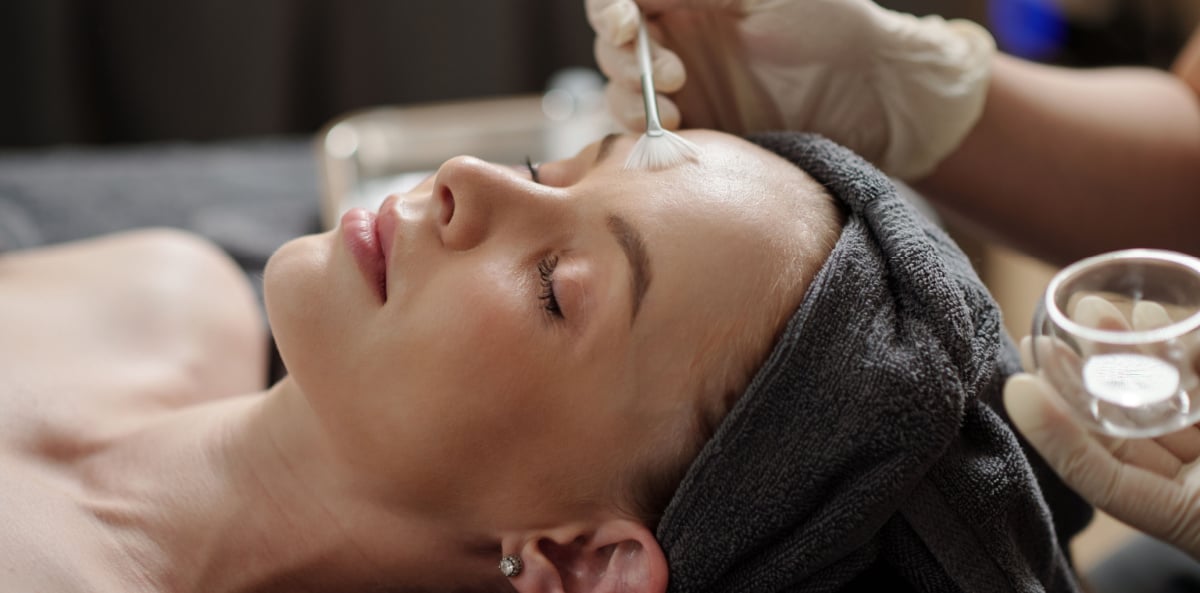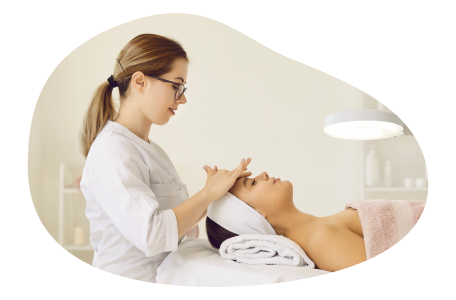How to become a successful, certified esthetician

What is an esthetician?
Estheticians are skincare specialists who work in the cosmetology and beauty industry. They focus on skincare and procedures like facials, pore cleansing, makeup application, chemical peels, hair removal, microdermabrasion, and exfoliation. They might also treat skin problems such as acne, hyperpigmentation, wrinkles, and scarring.
They’re often confused with cosmetologists, although these professions are not the same. Cosmetologists typically focus on a variety of services involving hair and hairstyling. Estheticians focus on skincare treatments and may be licensed to provide more advanced care.
Both professions are also different from dermatologists, who are physicians with medical degrees. Dermatologists specialize in conditions affecting the skin, hair, and nails. They might treat people for skin conditions such as rashes, wrinkles, psoriasis, or melanoma (skin cancer).
Education and experience requirements
Each state has different licensing requirements for estheticians to perform services such as waxing, cleansing, and facials.
They each require a high school diploma, or a GED, plus a specific number of education hours in an esthetics program that’s approved by the state board of cosmetology.
Esthetician programs can be found in community colleges, beauty schools, and cosmetology schools. Some training programs use the alternative spelling “aesthetics,” but their classes involve the same coursework.
Some states also require additional hours of training through an apprenticeship. A few states count education and esthetician training hours equally, so you could qualify for a test with any combination of the two.
Having both esthetician classes and the practical hands-on work through an apprenticeship can give you the knowledge and experience you’ll need to pass a licensing exam with the state licensing board. You’ll have to take a written exam and a practical exam that covers the most common skincare treatments.
Your state might have different licensing levels, such as a basic esthetician license and a master license.
A standard esthetician license allows you to do things like facial treatments, hair removal, spray tanning, eyebrow shaping, makeup application, manicuring, and pedicuring.
Master estheticians can perform more advanced skin care procedures, such as laser hair removal, chemical peels, eyelash extensions, and more advanced facial treatments, makeup application, manicures, and pedicures.
The Council on Occupational Education has a list of accredited professional schools, where you can search for accredited esthetician schools in your state.
The National Interstate Council (NIC) has information on state licensing tests, links to every state’s licensing board, and exam resources, including practice exams you can take online.
How to pay for esthetician school
The federal government offers a couple of options to help you pay for esthetician school. Any school you wish to attend must be accredited by the federal government to obtain funding.
Your options are:
- Direct subsidized and unsubsidized federal student loans
- Pell grants, which don’t have to be repaid
- Federal Supplemental Educational Opportunity Grant (FSEOG) for low-income students who qualified for a federal Pell grant, but still have financial needs beyond what the grant provides
You can check your eligibility status for all types of student aid, both grants and loans, through the Free Application for Federal Student Aid (FAFSA).
Many states also offer student loans and grants for those attending college or trade schools. Check with your state’s department of education for more information. Your school’s financial aid office can probably help you as well.
Do I need to be certified as an esthetician?
While you may not need certification to qualify for an esthetician license, it can help your career path because it lets you stand out from your competitors. It shows you have additional knowledge beyond your state license requirements.
An esthetician license is granted by your state licensing board. Esthetician certification can be acquired through the National Collation of Estheticians Association (NCEA). The NCEA reports that its esthetician certification program can be completed in as little as 4 to 6 weeks. It requires continuing education courses, followed by a written test.
Certification can also help if you move from one state to another. If you’re moving to a state that requires more hours of education and training than your current license, the licensing board in your new state might accept your NCEA certification as proof that you meet their more stringent requirements.

Protecting your services with the right insurance
It takes time and money to become a licensed esthetician and set up a business. Having the right esthetician business insurance can protect that investment from unforeseen risks and liabilities. These are the policies you may need:
General liability insurance: This covers basic third-party risks, such as a customer injury at your business. It also covers damage to a customer’s property and advertising injury. This is typically the first policy purchased by beauty professionals.
Commercial property insurance: Landlords typically require this to sign a lease. It covers your business’s physical location, business supplies, and equipment in case it’s lost, stolen, or damaged.
Business owner’s policy (BOP): A BOP combines your general liability coverage and commercial property insurance into one policy. It’s typically less expensive than buying each policy separately.
Professional liability insurance: Also known as malpractice insurance or errors and omissions (E&O) insurance, it covers the cost of lawsuits and settlements related to customer complaints of unsatisfactory work.
Workers’ compensation insurance: Most states require workers’ comp for any business with one or more employees. It covers the medical expenses and lost wages relating to workplace injuries and illnesses. Sole proprietors can also purchase this coverage, as your regular health insurance is unlikely to cover your medical bills from a work-related accident.
Cyber insurance: Also known as cyber liability insurance, this covers your costs involving data breaches and cyberattacks, such as a hacker stealing the personal data and credit card numbers of your customers.
Product liability insurance: If you make or sell skincare products, then product liability insurance can help with your legal expenses if someone sues you for property damage or injuries caused by your products.
Establishing your esthetician career
Your first step to a career as an esthetician will likely involve working in spas, salons, hotels, and resorts. You might also consider working as a makeup artist or a representative for a beauty company, although you might have to gain more experience first.
Even if you intend to start your own business, working in a salon can let you improve your skills as you learn from other people about different treatments, customer relationships, and salon management.
You might start out working directly for a spa owner as an employee, or having a shared space within a salon where you work as an independent contractor.
In this case, it would be important to read any contract agreement before you sign it. You might even have an attorney review any documents before you sign them, so you fully understand what you’re getting into.
If you intend to start your own esthetician business, you may have to get a general business license and/or register your business with your state and local government. Your local city or county clerk’s office, and your state’s Secretary of State website can help you figure out what’s required.
Promote your business
Starting your own website is crucial for any new business, as it’s how many of your future customers will find you. Make sure you include your license and certification information, so potential customers know that you’re legit.
You should also set up a Google Business Profile (formerly known as “Google My Business”). It will help your business show up in Google Search and Google Maps.
A social media presence is important, as you can interact with customers and encourage them to support your business by promoting your services online. If you have a particular skill or expertise you’d like to showcase, social media is great for sharing this kind of information.
You could also ask your satisfied customers if you can take their picture and post it on your website and/or social media accounts, especially if you can use pictures showing their before and after results. Just make sure you get their approval first, and you might ask them to sign a photo release form that allows you to use their picture.
If any customers are reluctant, you might consider editing their picture to conceal their identity—such as just showing their eyebrows or whatever features you worked on.
Word-of-mouth will also be an important part of promoting your business. You might consider offering discounts, free treatments, or coupons to any clients that bring you a new customer.
Join professional organizations
Esthetician organizations can offer you a wealth of resources on continuing your education on skincare, health, and business practices. They also provide networking opportunities, such as conferences where you can learn about new skincare methods and related subjects.
The National Aesthetic Spa Network calls itself one of the world’s leading organizations that empowers professionals through educational conferences, networking opportunities, and business award opportunities. Its members include 40,000 estheticians, spa providers, and wellness professionals.
Associated Skincare Professionals describes itself as the only exclusively licensed esthetician association, offering education and business planning solutions.

The benefits of working in the beauty industry
There are many reasons why people become estheticians. For one, it allows them to develop personal relationships and get to know their customers, while seeing firsthand how they can help their clients feel better about themselves and improve their sense of happiness.
It allows for flexible hours and scheduling, and you may have the option of working full-time or part-time. Keep in mind you may have to work nights or weekends, depending on when your clients are available.
You’ll also have flexibility in terms of where you work. Many estheticians start off working in a salon, spa, or similar environment, where they can learn from those with more experience.
Once you’re established as an esthetician and have a steady group of clients, you might choose to go into business for yourself and set up your own spa. You could also choose to offer specialized services, such as focusing on waxing or applying makeup.
Of course, not all estheticians work in beauty parlors and salons. You might consider a career in makeup in the film, TV, or advertising industries. Resorts, large hotels, and cruise lines also offer opportunities for estheticians.
What is a typical salary for an esthetician?
The average annual salary for estheticians in the U.S. is more than $42,000 per year, with a range of $19,000 to more than $94,000. Your level of experience and location can have a tremendous impact on this. According to Indeed.com, the highest annual salary for estheticians is more than $67,000 in Texas, compared to a little more than $30,000 in Las Vegas.

Get the right coverage with Insureon
Complete Insureon's easy online application today to get esthetician business insurance quotes from top-rated U.S. carriers. You can also speak with a licensed insurance agent to find the best, most affordable policies for your unique business needs.
Once you find the right policy for your small business, you can begin coverage and get a certificate of insurance in less than 24 hours.
Mike Mosser, Content Specialist
Mike spent several years as a reporter and editor covering politics, crime, and the world financial markets. He’s worked for several newspapers, a financial newswire, and a monthly magazine. As a copywriter, Mike has produced SEO-based content, marketing, public relations, and advertising work for a variety of companies.







